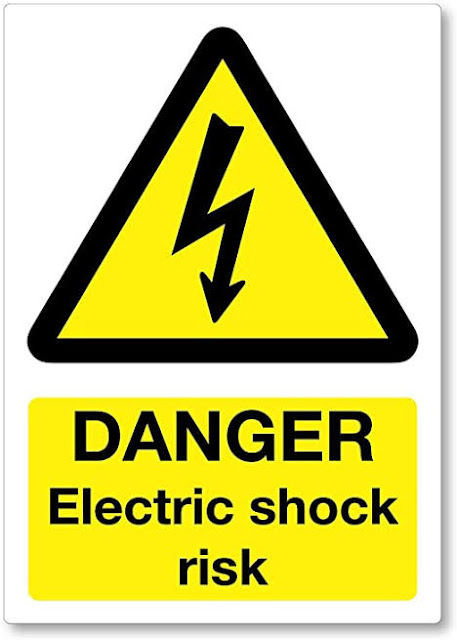ELECTRICAL SHOCK - CAUSE, SYMPTOMS, FIRST-AID, TREATMENT & SAFETY
ELECTRICAL SHOCK - CAUSE, SYMPTOMS, FIRST-AID, TREATMENT & SAFETY
In this article you learn about electric shock, its
symptoms, first aid, electrical safety and its treatment
An electric shock happens when an electric current passes
through your body. This can burn both internal and external tissue and cause
organ damage.
BELOW TWO PICTORIAL SYMBOL TO ALERT AGAINST ELECTRICAL SHOCK RISK
Electric shock is due to the flow of current through your
body. This is often from hand to hand or from hand to foot. A shock current as
low as 15mA a.c or d.c may be fatal.. obviously the size of shock current is
related to the applied voltage and your body resistance. Unfortunately, your
body resistance goes down as the applied voltage goes up. This means shock
current further increased at high voltages. The size of your body resistance
also depends on other factors such as your state of health, the degree of
contact with live wires and the dampness on your skin.
Do you know what is the dry body resistance?? Typically dry full-contact body resistance is about 5000 ohms at 25V falling to 2000 ohms at 250V.
What factors affects
how serious an electric shock is??
Well there are several other factors , including
- Voltage
- Type of current (AC/DC)
- Electricity’s path through your body
- Length of time in contact with the source.
- Overall health of person.
Do you know, an alternating current is often more harmful
than a direct current because it causes muscle spasms that make it harder to
drop the source of electricity. AC can freeze the patient hand to the current
source, while DC can throw the patient causing injuries.
If someone gets electric shock, you must visit hospital to consult a doctor as external burn you can see but internal damage if often hard to detect without a thorough medical exam.
What are the symptoms
of electric shock??
Symptoms depends on how severe it is. Potential symptoms of
an electric shock includes
- Cardiac arrest due to electric effect on the heart
- Loss of consciousness
- Muscle spasms
- Numbness or tingling
- Breathing problems
- Headache
- Burns
- Problem with hearing
- Irregular heartbeat
How can you get an
electric shock?
- By poorly insulated wires
- By ungrounded electrical equipment
- By using electrical equipment while in contact with water.
What should I do if I
or someone else has been shocked??
If you have been shocked
- If you receive an electric shock, it might be difficult for you to do anything. But try to start following if you think you are severely shocked.
- Let go of the electric source as soon as you can.
- If you can call 108 or local emergency service. If you can’t yell for someone else around you to call.
- Don’t move unless you need to move away from the electric source.
If the shock feels minor :
- Visit to doctor as soon as you can, even if you don’t have any noticeable symptoms. Remember, some internal injuries are hard to detect at first.
- In meantime, cover any burn with sterile gauze. Don’t use adhesive bandage or anything else that might stick to the burn.
What to do if someone else has been shocked??
If someone else receives electric shock then several things
have to be kept in mind as you have to help the victim as well as keep safe
yourself also. Be calm & don’t panic.
- Don’t touch someone directly (i.e. bare hand), if they are still in contact with the source of electricity.
- Don’t move someone who has been shocked, unless they are in danger of further shock.
- Turnoff the flow of electricity if possible. Use insulator (wood/rubber) to move the source of electricity away from the person. Just make sure you don’t use anything that’s wet or metal based.
- Check person’s response and breathing, it may be necessary to commence cardiopulmonary resuscitation (CPR).
- Talk calmly and reassuring to the person
- Call 108 or local emergency service, if person unable to breathe , high heartbeat or showing severe symptoms
- Cover the burn with sterile gauze if you can. Don’t use Band-Aids or anything else that might stick to the burn. Don’t remove dead skin or break blisters if the person has been burned.
- Keep the person warm
Do electric shocks have any long-term effects???
Yes. Some electric shocks can have a lasting impact on your
health. For example serious burns can leave permanent scars. And if the
electric current goes through your eyes, you may be left with cataracts. Some shocks
can also cause ongoing pain, tingling, numbness and muscle weakness due to
internal injuries.
How electric shocks are treated??
It depends on the injuries,
potential electric shocks treatment includes :
- Burn treatment – application of antibiotic ointment and sterile dressing
- Pain medication
- A tetanus shot – depends on source of shock and how it occurred
- For severe shocks, a doctor may recommend staying in the hospital for a day or two so they can monitor you for any heart issues or severe injuries.
- Diagnosis required – Electrocardiogram, complete blood count, urine test for muscle enzymes, x-ray, CT scan.










Comments
Post a Comment